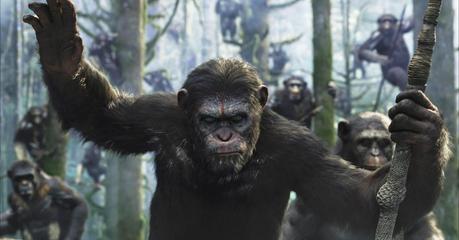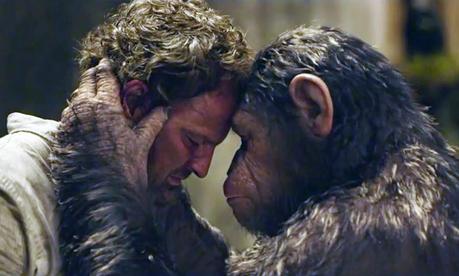 Rise of the Planet of the Apes (2011) was much better than expected. Admittedly it got more mileage from its awesome effects than the story, but it entertained while setting up a nascent franchise. Dawn of the Planet of the Apes (2014) ups the action and character conflicts, resulting in a satisfying sequel.
Rise of the Planet of the Apes (2011) was much better than expected. Admittedly it got more mileage from its awesome effects than the story, but it entertained while setting up a nascent franchise. Dawn of the Planet of the Apes (2014) ups the action and character conflicts, resulting in a satisfying sequel.Dawn picks up ten years after Rise, when simian flu has decimated humanity. Caesar (Andy Serkis) leads his apes, who've crafted a peaceful society in the wilderness. Human survivors gather within San Francisco, under the fanatical Dreyfus (Gary Oldman). Tensions arise when Malcolm (Jason Clarke) arrives with several specialists to rebuild an old dam. Caesar and Malcolm negotiate an uneasy truce, and the two leaders befriend each other. Too bad Koba (Tony Kebbell), Caesar's embittered right-hand ape, harbors a deep-seated grudge against humans.
Dawn begins with a breathtaking set-piece: Caesar's tribe hunting elk in the forest. It's a virtuoso set piece, CGI and motion capture used to thrilling effect (underscored by an eerie, 2001-inflected music cue). Director Matt Reeves immerses us in Caesar's world, masterfully visualizing his woodland retreat and showing the apes communicating only in grunts and sign language. Sadly they eventually grow more talkative and bipedal, understandable when dealing with humans but jettisoning the uniqueness. By Dawn's end the apes speak, act and scheme like humans.
Writers Mark Bomback, Rick Jaffa and Amanda Silver hammer home that apes aren't different than people, which explains Dawn's simian soap opera. Caesar wrestles not only with encroaching humans, but his wayward son (Nick Thurston) and sickly wife (Judy Greer). Meanwhile, bloodthirsty Koba contrives war with a false flag operation worthy of Richard III, or Joseph Goebbels. Somehow it's reassuring that even simian revolutions devolve into violence: that the villain's named Koba is surely no coincidence.

These conflicts are compelling enough, yet Dawn still takes the easy way out. Moral debates disappear in the second half, with a full-scale human-ape battle and Koba enslaving humans and dissident apes alike. I can't criticize that set piece as entertainment, with horse-mounted monkeys double-fisting assault rifles. I can criticize its dramatic convenience. We can't have Caesar misguidedly start a destructive war; a blockbuster demands a villain.
Once again, the apes steal the show. Andy Serkis continues his incredible work, providing Caesar with verisimilitude and genuine emotional depth. (Seriously, can't Serkis at least earn a special Oscar for mo-cap?) Dawn's standout is Maurice (Karin Konoval), a gentle orangutan who befriends human teen Alexander (Kodi Smit-McPhee). Combined with more conventional computer effects and action scenes, Dawn proves a visual wonder.
Rise's biggest failing was its human characters: next to Caesar and friends, nobody cared about James Franco and Freida Pinto. Jason Clarke, usually relegated to character roles, carries his end of Dawn with dignity and toughness. And Gary Oldman makes his villain surprisingly likeable: his brief scene scanning family photos humanizes Dreyfuss more than reams of dialog. Then again, it's easier to sympathize with underdogs of any species.
Dawn of the Planet of the Apes is an above-average summer movie. Whatever my quibbling reservations, it's always nice to see a blockbuster that puts some care into craftsmanship.

